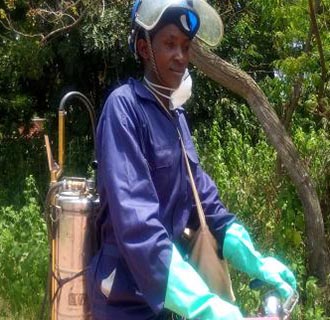
Joyce Mwipangi, Spray Operator at Inala Site in Kwimba District, Mwanza, Tanzania, said the quasi community-based approach worked well for the 2016 campaign.
Indoor residual spraying (IRS) remains an effective strategy against malaria in mainland Tanzania and Zanzibar. With increased insecticide resistance and the rising cost of effective insecticides, the President’s Malaria Initiative Africa Indoor Residual Spraying (PMI AIRS) Project is finding innovative ways to reduce operations costs without compromising the quality of the spray.
For the 2016 spray campaign, the PMI AIRS Project piloted a quasi community-based IRS design in four out of the eight IRS districts covered on mainland Tanzania. The districts include Sengerema and Kwimba in Mwanza Region, Butiama in Mara Region, and Bukoba Rural in Kagera Region.
The design involves a combination of the community-based approach (which uses bicycles and multiple operations sites and sub-sites) and the district-based approach (which use vehicles to transport spray teams and fewer operation sites). The district-based approach is used to reach distant communities. Once the remote communities have been covered, the project switches to using bicycles to reduce vehicle costs.
This combined approach reduced the transport costs by approximately 21 percent in the 2016 spray campaign while still achieving high spray quality. It also reduced the time that spray operators had to walk between houses far away from one another as they could use their bicycles.
The level of community involvement also increased as spray teams used their own bicycles. Daily bicycle allowances are made available to the spray operators for maintaining their bicycles.
The quasi community-based IRS approach is helping to improve cost-efficiency of IRS in Tanzania.
This story was taken from www.africairs.net.
